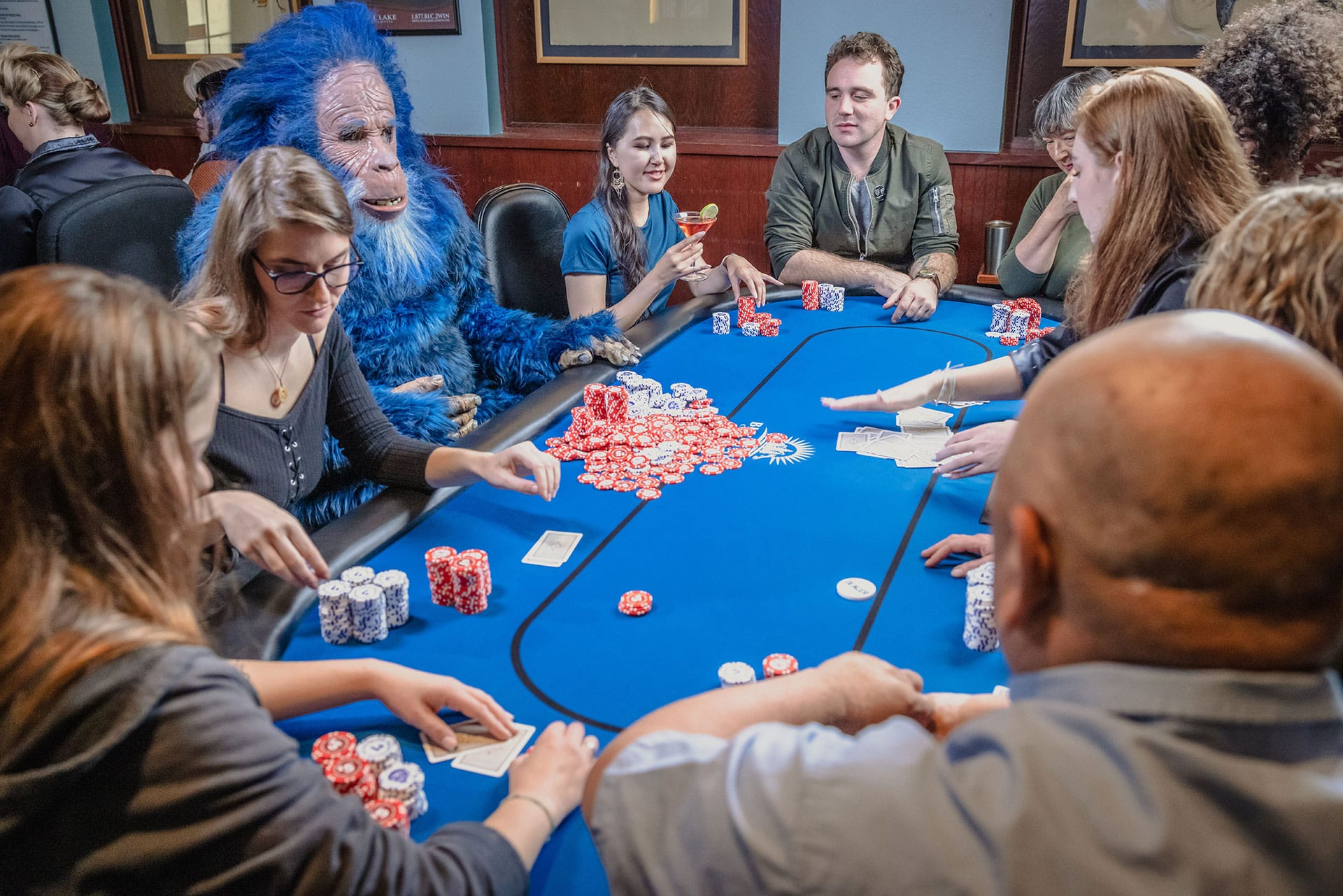Is Poker a Game of Luck or Skill?

There is a long-raging debate over whether poker is a game of luck or a game of skill. When you sit down at the poker table, are you more likely to win because you’ve been dealt the right cards at the right time or because you can skillfully read your opponents and make the right plays? There are committed and experienced players on both sides of the debate. While we’re unlikely to convince anyone who’s entrenched in their thinking on either side, we’re confident in saying that both luck and skill play an important role in any winning poker hand. So, is poker luck or skill? The answer lies in the balance of both elements contributing to the outcome.
What is Poker?
Poker is a family of card games that combine gambling, strategy, and skill. All poker variants involve betting as an intrinsic part of play, and the winner of each hand is determined according to the combinations of players’ cards, at least some of which remain hidden until the end of the hand. Popular forms of poker include Texas Hold’em, Omaha, Seven-Card Stud, and more. Each variant has its own set of rules and strategies, but the fundamental principles remain the same.
Understanding Luck in Poker
There are several ways that luck can influence the play in poker. You just never know what the next card will be – for you or the other players – and you never know who will be sitting across from you at the table and what their skill level will be. Understanding these influences and how to plan a strategy around them can help you improve your chances of winning. So, is poker luck or skill? It’s a blend of both, with luck affecting the cards dealt and skill shaping how you play those cards.
Randomness of Hands
In poker, the cards you are dealt play a significant role in the outcome of each hand. The randomness of the card shuffle means that you have no control over which cards you receive. While that can work in your favor – giving you a hand that will let you run the table – it can also work against you, making it impossible for you to win on the cards alone. The good news is that good luck can help you win even if you are not especially skilled. The bad news is that unless you’re great at reading your fellow players and making the right bluffs, you’ll be at the whim of the cards for your wins.
Community Cards
In variants like Texas Hold’em and Omaha, community cards are dealt face-up in the center of the table and are shared by all players. The randomness of these cards can dramatically alter the strength of your hand. Even the best players can find themselves at the mercy of the community cards, which can either improve their hand or give their opponents the winning combination. And when there are community cards that help your hand, they may also be helping your opponents.
Unpredictable Outcomes
Poker is full of unpredictable outcomes due to its inherent randomness. For example, you might have a weaker hand but end up winning the pot if you get a lucky card on the river (the final community card in Texas Hold ‘Em). Conversely, you might have the best hand throughout the game but lose if an opponent catches a lucky break on the final card. This unpredictability is a testament to the significant role that luck plays in poker.

Understanding Skill in Poker
When the odds are against you, strategy can help you out of many situations, both in poker and in life. Learning how to read your fellow players, knowing when to take additional cards, and betting the right amounts at the right time can all help you come out on top, even when the cards are not on your side. You can’t do anything about the cards you are dealt, but you can certainly make the right decisions about how to use those cards and available strategies to your advantage.
This highlights the essential question: is poker luck or skill? While luck determines the cards you receive, skill allows you to navigate and optimize the hand you’re dealt, showcasing the critical role of strategy in the game.
Strategic Betting
Skillful poker players use strategic betting to influence the game in their favor. Betting strategies involve understanding pot odds, implied odds, and the value of your hand in relation to the possible hands that your opponents might have. By betting wisely, skilled players can maximize their winnings on strong hands and minimize their losses on weaker ones. Strategic betting also includes techniques like value betting, where players bet to extract more money from their opponents when they have a strong hand, and semi-bluffing, where players bet with a drawing hand to potentially win the pot outright.
Bluffing
Bluffing is a fundamental skill in poker that allows players to win pots without having the best hand. A successful bluff can force opponents to fold better hands, giving the bluffer the victory. Skilled players know when to bluff based on their opponents’ tendencies, the quality of the community cards, and the betting patterns in the game. Bluffing too often can make a player predictable, while never bluffing can make them easy to read. Finding the right balance is key to effective bluffing.
Reading Opponents
Reading opponents is another crucial skill in poker. This involves observing their behavior, betting patterns, and body language to deduce the strength of their hands. Skilled players use this information to make informed decisions about whether to call, raise, or fold. They can identify tells—subtle signals that indicate whether an opponent is bluffing or has a strong hand. Understanding opponents’ tendencies and adapting to their play styles can provide a significant edge in the game.
By mastering these skills, players can improve their chances of success in poker. While luck determines the initial deal of the cards, skillful play can influence the outcome of the hand and the overall game. In the long run, players who consistently apply strategic betting, effective bluffing, and accurate reading of opponents will outperform those who rely solely on luck.

How Luck and Skill Work Together
The debate continues: is poker luck or skill? This interplay between luck and skill is what makes poker both challenging and engaging, requiring players to adeptly balance both aspects to succeed.
Poker is a unique game where luck and skill are intertwined in a dynamic and fascinating way. Understanding how these elements work together can provide insight into the complexity and appeal of the game, and it can give you an edge when developing your strategy for the game. Just like a tennis player cannot predict the next angle of the ball coming at him, he can develop strategies to respond decisively and to make the right plays to gain the winning edge. You can do the same in poker, but you have to know how to make these elements work together in your favor.
Short-Term Luck vs. Long-Term Skill
In the short term, luck can have a significant impact on the outcome of poker games. A player might win or lose a hand based on the random distribution of cards, regardless of their skill level. This short-term variance is why even novice players can occasionally win against experienced professionals.
However, in the long run, skill tends to prevail. Skilled players consistently make better decisions, manage their bankroll effectively, and read their opponents more accurately. Over many hands, these advantages add up, particularly since luck is too fickle and will not allow players to make consistent gains, thus allowing skilled players to achieve more consistent and substantial results. Therefore, while luck determines the short-term fluctuations, skill shapes the long-term success in poker.
Is Poker More Luck or Skill?
Determining whether poker is luck or skill is a nuanced question. As stated above, in the short term, luck can dominate, leading to unpredictable outcomes and surprising victories for some. However, over extended play, skill becomes the dominant factor. Skilled players can navigate the variance of luck, making informed decisions that mitigate their losses and enhance their chances of winning over time.
While luck can give you occasional wins and will be the dominating force in the short-term outcomes of poker, skill is more influential in determining long-term success. Learning how to navigate the interplay of luck and skill is what makes poker both challenging and exciting, attracting players of all levels to test their abilities and fortunes.
Play Poker at Blue Lake Casino Hotel
Playing a few rounds of poker with friends can be fun, but there’s nothing like putting your skills and luck to the test against a variety of players in a real casino environment. Experience the thrill of poker and see firsthand how luck and skill interact by visiting Blue Lake Casino Hotel. Our casino offers a variety of poker games suitable for all skill levels, from beginners to seasoned pros. With a friendly atmosphere, professional dealers, and well-maintained tables, Blue Lake Casino Hotel is the perfect place to enjoy a game of poker. Join our player rewards club to earn more perks while you play, adding to your winnings. You can also eat at one of our delicious restaurants, enjoy live entertainment, indulge in some pampering at our spa, or book a stay at one of our luxury suites. Come and play poker at Blue Lake Casino Hotel and discover the balance of luck and skill that makes this game so captivating, then extend your stay to indulge and relax and treat yourself like the winner you are.